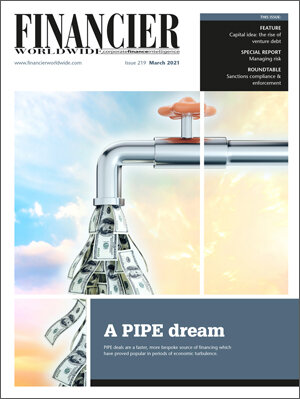What UAE businesses need to know about amended economic substance regulations
March 2021 | SPOTLIGHT | CORPORATE TAX
Financier Worldwide Magazine
The severe economic impacts of coronavirus (COVID-19), coupled with the drop in oil prices, have increased fiscal pressure on regional tax authorities. Governments have already started to reassess their medium to long-term fiscal strategies to raise revenue to cover the costs of COVID-19. The Saudi Ministry of Finance recently announced an increase in the value added tax (VAT) standard rate from 5 to 15 percent, effective from 1 July 2020. Further countries in the Gulf Cooperation Council (GCC) are expected to introduce VAT. For example, Oman will introduce VAT which will be effective and applicable from April 2021.
These changes are potentially far-reaching, and it is critical that businesses operating within the region are fully aware of them. As a result of the need to raise additional revenue, the focus and intensity of tax audits are likely to increase in the near future, given the increase of information required to be disclosed and made available to tax authorities as a result of economic substance and country-by-country reporting (CbCR).
Background
In May 2018, the UAE signed up to a project group operated through the Organisation for Economic Co-operation and Development (OECD), which was entitled Base Erosion and Profit Shifting (BEPS). This will bring the UAE’s reputation as a tax haven under increased scrutiny. On 30 April 2019, the UAE introduced economic substance regulations (ESR) and CbCR.
On 10 August 2020, the UAE cabinet of ministers issued ‘Cabinet of Ministers Resolution No. 57 of 2020’, along with amended guidance through Ministerial Decision No. 100 of 2020, which repeals and supersedes the ‘Cabinet of Ministers Resolution No. 31 of 2019’. The ESR require all companies and certain other business forms that carry out “relevant activities” to maintain and demonstrate an adequate “economic presence” in the UAE relative to the activities they undertake.
When the Ministry of Finance (MoF) amended the ESR, it made some changes to the legislation, particularly in relation to definitions and exemptions. The amended ESR also changed the national assessing authority to the Federal Tax Authority (FTA), whereas previously it had been the relevant regulatory authority. The FTA will be responsible for assessing and enforcing compliance of UAE entities with the economic substance test.
Licensees that have already submitted an economic substance notification directly to their relevant regulatory authorities will now be required to resubmit a notification, and in the case of those carrying out one or more “relevant activities” an economic substance report electronically on the MoF portal that is accessible on a webpage.
Other key points to note about the economic substance notification and report in order to assist a business to file them are as follows. First, the notification and report templates can be found on the MoF website. Second, licensees that do not earn any income or fall under the definition of exempted licensee (e.g., if a licensee is a branch of a foreign entity and its income is subject to tax in a foreign jurisdiction) are still required to file a notification but are not required to file a report. Other exemptions can be found in the amended ESR. Third, the UAE MoF has issued amended guidance (Ministerial Decision No. 100 of 2020), which should assist firms to determine whether they conduct a relevant activity which includes a holding company, a licensee that provides services to a foreign related party or makes loans or rents assets to related parties for consideration. Finally, the filing deadline for notifications and reports on the MoF portal for businesses with a financial year ended 31 December 2019 is 31 January 2021. Failure to resubmit a notification and report before the deadline will result in penalties of AED 20,000 and AED 50,000 respectively under Articles 13 and 14 of the amended ESR.
Action needed
UAE businesses are strongly advised to carry out an initial economic substance impact assessment, in order to be prepared for the filing of an economic substance notification, and later, an economic substance report, where required, as the deadline to resubmit the notification is fast approaching.
Even more importantly, companies need to understand the potential tax effect of these changes on their businesses. Many businesses have already failed to meet the economic substance test and failed to demonstrate sufficient economic substance in their first reporting period, so could be subject to a penalty of AED 50,000. The fines increase to AED 400,000 for the subsequent fiscal year.
It is strongly recommended that businesses comply with relevant filing deadlines for both notifications and reports in order to avoid penalties and seek advice particularly where the business has more complex operations. The above information should hopefully help businesses to understand the requirements and potential implications of these far-reaching tax changes in the UAE.
Steven Ireland is head of international tax at Grant Thornton UAE. He can be contacted on +971 (56) 663 2999 or by email: steven.ireland@ae.gt.com.
© Financier Worldwide
BY
Steven Ireland
Grant Thornton UAE

